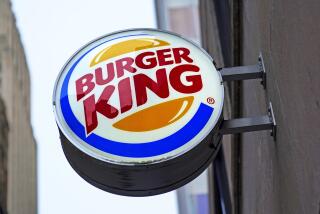Silly Warning Labels Are Sign of Increased Corporate Worry : Liability: New awareness of big-money judgments has companies going out of their way to forestall lawsuits.
BOSTON — Driving with a big cardboard sunshade covering your car’s windshield is not a good idea. It says so, right on the sunshade, in red block letters.
*
“Warning: Do not drive with sunshade in place. Remove from windshield before starting ignition.”
Warning: Where there is any threat of a lawsuit, there is a warning label. And some of them seem downright absurd.
Consumers are told that their coffee is hot, that a knife blade is sharp, that it is unwise to fold a walker with a baby sitting in it. Oh, and avoid that moose on the road: It could kill you.
Take that tip about the sunshade. Anyone who merges onto the freeway with one of those in place probably needs a lot more help than a warning label.
“We’re just trying to cover our backs on this,” said Lia Terry, marketing coordinator for Autoshade Inc. of Moorpark, the shade’s manufacturer.
Terry said some customers have actually called and complained after they took to the road, blind. “Some people don’t think too clearly,” she said.
Legally, manufacturers have no obligation to warn anyone about “open and obvious” dangers from their products.
That’s why ripsaws--the ones with the wooden handles and big, sharp teeth--carry no warnings. People who use ripsaws to pick their teeth get what they deserve, or so the theory goes.
“You don’t have to put a warning on an airplane propeller saying, ‘Don’t walk into this propeller when the engine is running,’ ” said Tom Barba, a Washington lawyer who defends manufacturers sued after their products are involved in an injury.
He calls such seemingly obvious warnings part of a “belt and suspenders approach” to product liability. The idea is to protect against the chance that some jury, somewhere, might find the company at fault for something that looked obvious. What in-house lawyer is going to stake his job, or his company’s future, on that never happening?
Groups such as the American National Standards Institute publish guidelines for warning labels.
But that doesn’t help manufacturers who must sell products in different states, each with its own courts shaping liability laws.
And a warning label is no blanket protection against liability.
“You can’t make a dangerous product safe by sticking a label on it,” said Leonard Glazer, a Boston lawyer who represents people who sue after being injured. “The paramount thing with any product is to design it to be safe in the first place.”
Glazer won an appeals court case in the 1980s in which two workmen were hurt when the fast-drying contact cement they were using caused an explosion. The company argued that it had warning labels. But documents showed it knew the warnings were inadequate; they were changed after the accident.
Another attorney, Edson Rafferty of Cambridge, has successfully sued automatic door manufacturers and producers of the asthma drug cheophylline.
The labels on the doors--”Caution: Door May Close Without Warning”--are virtually useless, Rafferty said.
“You have to get hit by the door to see it because the print is so small,” he said. “And once the door opens, you don’t see the warning anyway.”
One irony about the labeling binge is that a popular belief--that big-money judgments in product liability cases are spiraling out of control--may be wrong.
Sociologist Thomas Koenig and Suffolk University law professor Michael Rustad have found that the number of such cases has been fairly constant since 1980, not counting fast-growing asbestos lawsuits.
Koenig and Rustad oppose proposals to limit punitive awards--which go beyond the cost of damages--because they believe companies would slack off on safety if they didn’t fear a big financial hit.
Last year, a woman won her lawsuit against McDonald’s Corp. after suffering third-degree burns from spilled coffee. The jury agreed that McDonald’s sold coffee at between 180 and 190 degrees, even though it knew that could cause such burns in a few seconds.
“The fear of these lawsuits is exaggerated. But I think that’s a good thing. It makes the corporations more cautious,” said Koenig, a professor at Northeastern University. “I want them to be afraid of a crazed jury, of an angry public.”






